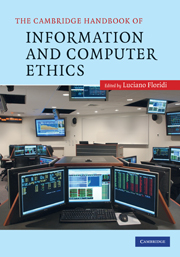Book contents
- Frontmatter
- Contents
- List of contributors
- Preface
- Acknowledgements
- Part I Introduction and background
- Part II Ethical approaches
- 3 Values in technology and disclosive computer ethics
- 4 The use of normative theories in computer ethics
- 5 Information ethics
- Part III Ethical issues in the information society
- Part IV Ethical issues in artificial contexts
- Part V Metaethics
- Epilogue: The ethics of the information society in a globalized world
- References
- Index
3 - Values in technology and disclosive computer ethics
Published online by Cambridge University Press: 05 June 2012
- Frontmatter
- Contents
- List of contributors
- Preface
- Acknowledgements
- Part I Introduction and background
- Part II Ethical approaches
- 3 Values in technology and disclosive computer ethics
- 4 The use of normative theories in computer ethics
- 5 Information ethics
- Part III Ethical issues in the information society
- Part IV Ethical issues in artificial contexts
- Part V Metaethics
- Epilogue: The ethics of the information society in a globalized world
- References
- Index
Summary
Introduction
Is it possible to do an ethical study of computer systems themselves independently of their use by human beings? The theories and approaches in this chapter answer this question affirmatively and hold that such studies should have an important role in computer and information ethics. In doing so, they undermine conventional wisdom that computer ethics, and ethics generally, is concerned solely with human conduct, and they open up new directions for computer ethics, as well as for the design of computer systems.
As our starting point for this chapter, let us consider some typical examples of ethical questions that are raised in relation to computers and information technology, such as can be found throughout this book:
Is it wrong for a system operator to disclose the content of employee email messages to employers or other third parties?
Should individuals have the freedom to post discriminatory, degrading and defamatory messages on the Internet?
Is it wrong for companies to use data-mining techniques to generate consumer profiles based on purchasing behaviour, and should they be allowed to do so?
Should governments design policies to overcome the digital divide between skilled and unskilled computer users?
As these examples show, ethical questions regarding information and communication technology typically focus on the morality of particular ways of using the technology or the morally right way to regulate such uses.
Keywords
- Type
- Chapter
- Information
- Publisher: Cambridge University PressPrint publication year: 2010
- 74
- Cited by

